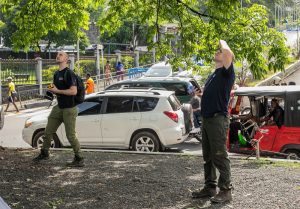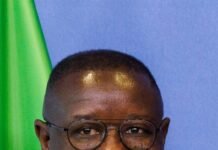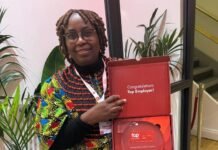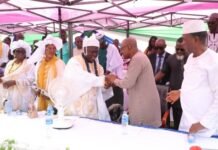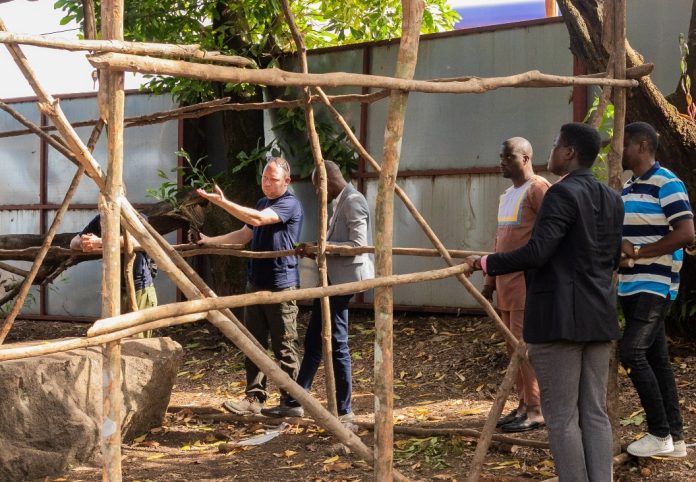
By Alvin Lansana Kargbo
In a landmark effort to preserve one of Sierra Leone’s most cherished national symbols, Africell Sierra Leone has on December 9, 2024 partnered with the Ministry of Tourism and Cultural Affairs to collaborate with experts from the Royal Botanic Gardens (RBG), Kew. The initiative aims to conserve the historic Freetown Cotton Tree, which suffered significant damage during a fierce storm in May 2023.
Standing nearly 70 meters tall, the Freetown Cotton Tree is a monumental landmark symbolizing Sierra Leone’s cultural and historical heritage. Its significance dates back to the abolition of slavery, with accounts of freed Africans gathering under its branches in prayer upon their arrival in the Province of Freedom, later known as Freetown. The tree’s role as a spiritual and cultural icon extends beyond the colonial era, serving as a meeting point for local chiefs and a revered site in indigenous religious and magical practices.
On May 24, 2023, a storm battered the city with heavy rain and winds, causing part of the Cotton Tree’s trunk to crack and fall. The collapse sparked nationwide mourning and drew global attention, with many lamenting the loss of an enduring emblem of Sierra Leone’s identity.
Subsequent assessments revealed that environmental factors such as pollution, neglect and roadwork-induced encroachments on the tree’s root system had weakened its structure, leaving it vulnerable to the storm’s force. Recognizing the cultural and historical importance of the tree, Africell, one of Sierra Leone’s leading telecommunications providers, took a proactive role in ensuring its conservation.
Africell’s collaboration with the Ministry of Tourism and Cultural Affairs enlisted the expertise of RBG Kew, a globally renowned botanical research institution. With extensive experience in arboriculture, Kew’s involvement is seen as critical to safeguarding the tree’s remains and exploring possibilities for re-growth.
From November 11 to 15, 2024, Kevin Martin, Head of Tree Collections at RBG Kew and Tom Fry, Arboricultural Supervisor, visited Freetown. Their visit involved an extensive technical study of the Cotton Tree’s condition. Accompanied by Africell representatives, the Kew team engaged with stakeholders, including officials from the Ministry of Tourism and Cultural Affairs, the Mayor of Freetown, the British High Commissioner and faculty from the Biological Sciences Department at Fourah Bay College.
During their visit, Martin and Fry led a workshop at Fourah Bay College, focusing on how urban trees act as vital defenses against climate change. The workshop aimed to inspire local students and scientists to contribute to preserving Sierra Leone’s ecological heritage. “Freetown’s Cotton Tree transcends normal commercial considerations,” stated Sam Williams, Africell’s Group Communications Director. “Africell and the Africell Impact Foundation are committed to using our resources to promote culture and heritage. Preserving the Cotton Tree is a monumental task with both national and global implications.”
The findings from Martin and Fry’s study will be compiled into a formal report for the Ministry of Tourism and Cultural Affairs, which will outline the technical condition of the tree and propose necessary measures for its stabilization and potential re-growth. The report is expected in early 2025.
According to Kevin Martin, “From a technical point of view, it is relatively straightforward for us to understand the tree’s condition and provide recommendations for its management. But what makes this project unique is its profound cultural context. The Cotton Tree is a symbol of Sierra Leonean identity and we are honored to contribute to its preservation.”
Future phases of the project may involve further assessments, hands-on interventions and increased engagement with local experts and students. The goal is to ensure that RBG Kew’s knowledge transfer supports Sierra Leone’s local scientific community, fostering homegrown skills and capacity for long-term conservation efforts.
Beyond physical preservation, efforts are underway to memorialize the Cotton Tree’s legacy. As seen with other iconic sites like the Notre-Dame Cathedral in Paris, which was damaged by fire, disasters often spur global support for restoration efforts. Africell and its partners aim to use the Cotton Tree’s plight to draw attention to its cultural and historical significance and ensure its story is preserved for future generations.
Edward Kwame Yankson, Permanent Secretary at the Ministry of Tourism and Cultural Affairs, emphasized the importance of the initiative. “The day the Cotton Tree fell was a sad day for Sierra Leone. However, we are heartened to have partners who believe that the tree’s story is far from over. By restoring it, whether physically or through memory, education we keep alive its role as a source of national pride and reflection.”
Africell provides mobile network coverage and technology services to over 15 million subscribers across sub-Saharan Africa, operating in Sierra Leone, The Gambia, Angola and the Democratic Republic of Congo. As the only U.S.-owned mobile network operator in Africa, Africell employs over 10,000 people and supports arts, education and cultural initiatives through its Africell Impact Foundation.
This joint effort with RBG Kew and the Ministry of Tourism and Cultural Affairs underscores Africell’s commitment to preserving Sierra Leone’s cultural heritage while promoting sustainable development and knowledge sharing. The future of the Cotton Tree remains uncertain, but with the combined efforts of international experts, local authorities and private sector partners, the hope for its regeneration burns bright.
